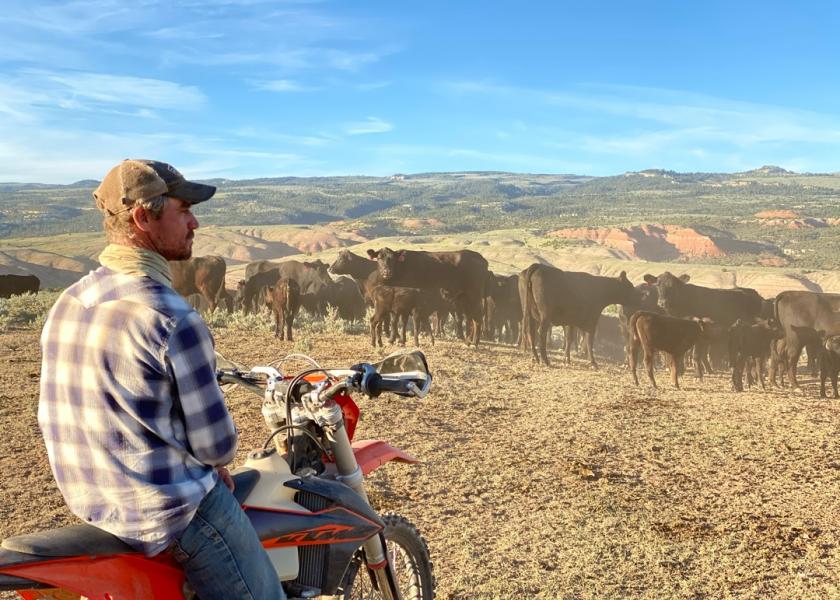Finding Power in Regenerative Solutions: Wyoming Ranch Foregoes Commodity Norm

"Ranching is a tough life. It’s hard on bodies. I took the approach, ‘I want the ranch to work from me, more than me work for it,’” says RC Carter of Carter Ranch and Carter Country Meats. Near Ten Sleep, Wyo., the Carter Ranch calls the western slope of the Big Horn Mountains home.
Historically a cow-calf operation, when Carter returned from college to work on the ranch full time, the operation took a logical step to keep up with the times by developing fields with irrigation pivots. When it came time to plant the fields, Carter chose to forgo the commodity norm and monoculture of corn or alfalfa. Carter planted 100% grass, pasture mixes on nearly 500 acres of irrigated soil, which has led to their operation baling the hay and chopping for haylage to feed their cattle.
Around the same time, nearly 11 years ago, Carter decided to expand the ranch’s portfolio and provide beef to the restaurant industry. After processing 80 animals in this new venture, the restaurants discovered their need for beef was less than originally quoted.
With nearly 80,000 lb. of beef to move within the year, Carter says, “it was a really challenging scenario that we found ourselves in, like survival mode.”
After knocking on doors and getting in the back door of restaurants, Carter began to understand the food industry and found a disconnect between restaurant chefs and ranchers.
“I always looked at our animals as ‘it’s a cow,’ but when we got into the meat and restaurant industry, we realized, this isn’t just a cow. It connected the dots to food and the education that needs to be there to add value to your carcass,” Carter explains.
A Mindset Shift
Again, taking the road less traveled, Carter transitioned their corn-finished beef operation to a regenerative, grass-finish model.
“I came to the realization that people were raising food way before someone started selling us a jug [of chemical] to grow it with,” Carter says. With the high input costs and ‘drug-addict’ like soils, needing artificial chemicals and inputs to make plants grow, Carter chooses to focus on regenerative agriculture solutions.
This year, Carter implemented targeted adaptive grazing to encourage cattle to forage on all plants within a sectioned area, especially the invasive and less palatable species. This hot-wire area is then moved after tight grazing.
“What we found by keeping a tight group, cows get really fat on cheatgrass sheet and false annual ryegrass quick. It’s great, and that’s what the soil needs. The soil needs to be tilled up and hammered very hard, but then you have to release, let it rest for a year or two, and never graze it the same way twice,” Carter says.
The Big Horn Basin is claimed to have had nearly 6 million bison travel through each year. However, today, the area is capped at only 50,000 animals, proving the country was much more productive hundreds of years ago.
“We’re all so busy chasing dollar bills and only focusing on the short term, rather than looking at the long-term effects of what we’re doing,” Carter says. “What are we going to leave our kids? Soil that’s less productive than it was before?”
Carter credits the group Understanding Ag as a key in the ranch’s shift toward regenerative practices.
Since the ranch’s operational shift, Carter describes big changes he’s seen on the ranch, including a return of dung beetles and other decomposing life, as well as a deeper connection with the livestock as they work in and around them while frequently moving fence to the next grazing area.
“It’s a really rewarding experience as we transition from going out and chasing our cows, to now, we go out to greet them from one pasture to the next.”
Despite the challenges within the beef industry and supply chain, Carter explains, “At the end of the day, I truly believe that the source of a country’s power is its food.”
The Carter Ranch believes in a grass-fed model for regenerative agriculture to produce a nutrient-dense product.
Carter Country Meats brings this idea to the consumer through the restaurant industry, direct online sales and Carter’s One Cow restaurant in Ten Sleep, Wyo.
Carter believes there is power in local relationships and gaining trust from consumers. “At the end of the day, people just don’t want to be lied to,” Carter says.
As ranches continue to fight a battle of rising costs and consumer pressure, he says, “Nobody is going to save us. We have to save ourselves. And that comes through personal relationships, honesty and integrity.”
*Editor's Note: This story has been updated from the original article published on July 29, 2022.







